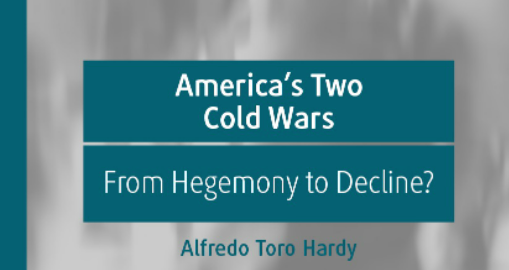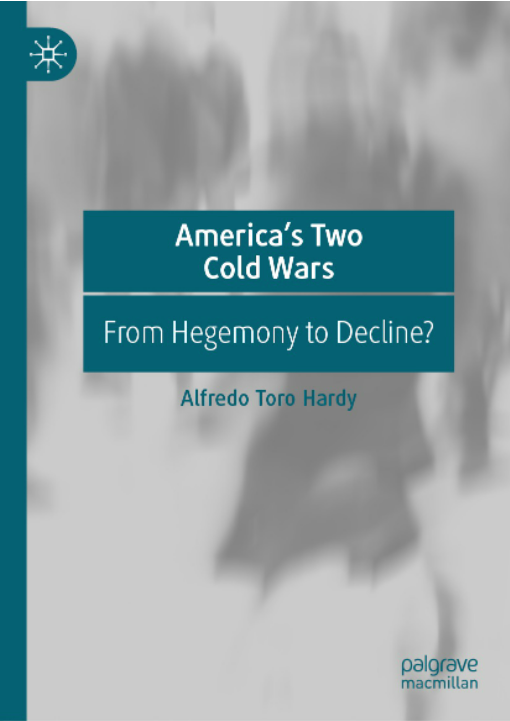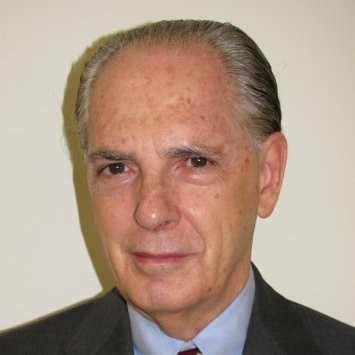New book published. It investigates the global challenges for the United States and the upcoming competition with China.
- Alfredo Toro Hardy: America’s Two Cold Wars: From Hegemony to Decline? Palgrave Macmillan, 2022. More information: Springer — Amazon
Below: GLO interview with the author!
- Without a single shot being fired, the United States had won the Cold War. This led to the homogenization of the world under America’s liberal order. Its global hegemony, though, proved to be brief. A country that arrived from the blue, China, is now contesting the U.S. primacy.
- China has been the driving force of a whole array of multilateral cooperative initiatives that have kept a lid on its nationalistic excesses and enhanced its global convergence appeal.
- China’s GDP is in the process of surpassing that of the United States. It has already developed the capability to technologically offset America’s superior forces through disruptive asymmetric weapons.
- During its first Cold War the U.S. had the wind on its back. All the right configuration of elements supported it. In this emerging Cold War with China the opposite happens as the U.S. confronts the wrong configuration of factors. With such inauspicious outlook Washington should explore other alternatives to Cold War.
ALFREDO TORO HARDY is a Venezuelan retired diplomat, scholar and author.
- He has a PhD on International Relations by the Geneva School of Diplomacy and International Affairs, two master degrees on international law and international economics by the University of Pennsylvania and the Central University of Venezuela, a post-graduate diploma in diplomatic studies by the Ecole Nationale D’Administration (ENA) and a Bachelor of Law degree by the Central University of Venezuela.
- Before resigning from the Venezuelan Foreign Service in protest for events taking place in his country, he was one of its most senior career diplomats. As such, he served as Ambassador to the United States, the United Kingdom, Spain, Brazil, Singapore, Chile and Ireland. He directed the Diplomatic Academy of the Venezuelan Ministry of Foreign Affairs, as well as other Venezuelan academic institutions in the field of international affairs.
- He is an Honorary Research Fellow of the Geneva School of Diplomacy and International Relations and has been a Visiting Professor at the universities of Princeton and Brasilia and an on-line Professor at the University of Barcelona. He has also been a Fulbright Scholar, a two-time Rockefeller Foundation Bellagio Center Resident Scholar and an academic advisor on diplomatic studies to the University of Westminster.
- He has authored twenty-one books and co-authored fifteen more on international affairs and history, while publishing thirty peer reviewed papers on the same subjects. His latest book America’s Two Cold Wars: From Hegemony to Decline? was published by Palgrave Macmillan in March 2022.
INTERVIEW
GLO: In your book you argue that the United States won the Cold War with the Soviet Union, and is now at the outset of a new Cold War with China. Is this not an illusion in the face of the invasion of Ukraine, where we are confronted again in a radical way with a split of the world between democratic and autocratic regimes with Russia as a particularly aggressive opponent? This new war seems to be hot, not cold.
Alfredo Toro Hardy: The idea of an ideological split of the world between democratic and autocratic regimes, with the U.S. towering again a “free world” notion, is controversial. Notwithstanding that Russia’s invasion to Ukraine has provided a temporary support to Biden’s democracy versus autocracy proposal, the fact remains that America’s liberal order has been invaded by the cancer of populism and its functioning and basic norms are under threat. In three years’ time Washington could be inaugurating a fresh Trump administration.
Conversely, at least in the case of China there is no interest whatsoever in promoting or weighing an ideological contest on behalf of authoritarianism. First, since Deng Xiaoping days’ results are all that matter. A straightforward social contract exists between the Chinese Communist Party and the people: We’ll make you better off and you will follow our orders. Efficacy becomes the magic word. Second, the authoritarian nature of the Chinese regime is not tantamount to ideology but to culture. A political culture that dates back to 221 BC with the establishing of the Qin dynasty and that presents the CCP regime as part of a continuum within China’s long dynastic history. This duality efficacy-culture is not prone to ideological disquisitions.
As for Russia’s invasion of Ukraine other elements are also in line: Its historical obsession with borders, imperial nostalgia, Ivan Ilyn’s fashionable ideas on Russia’s exceptionalism and the need of spiritual renewal. And so on.
In sum, the ideologically oriented dichotomy democracy versus autocracy fails to capture the complexities involved within the great powers competition.
GLO: While Russia may live on its natural resources and the military, China badly depends on trade and technology. China seeks world domination beyond military strength and needs the collaboration of the Western World. Will globalization return or will we see a bipolar world again?
Alfredo Toro Hardy: China has indeed become the main promoter and defender of globalization. However, trends are moving in the opposite direction. This requires some explanation. Globalization emerged as a result of political intention and technological feasibility. Now, it finds itself seriously challenged for the same reasons. In both cases, political intention and technological feasibility are clearly identified with Western economies.
Globalization, as its promoters assumed, would mainly benefit the Western world as fast moving nations appeared to be the better prepared to take advantage from a rapidly moving global economy. Based on this assumption, Western nations and the economic multilateral institutions under their control, gave the necessary steps to make globalization a reality. Political intention was reinforced by technological feasibility. One centered in the so called supply chains and global chains of value, which allowed for the offshoring of countless manufacturing and service jobs within an integrated world economy.
However, political intention has been reversing course. The massive contraction of traditional employments and the dramatic shrinking of middle classes within Western economies, ignited this change. A wave of protectionism and economic nationalism has kept globalization under siege. On its side, a technological feasibility centered in the Fourth Industrial Revolution makes possible the onshoring of economic activities to the Western world. Why, indeed, go manufacturing or looking for service providers afar, when technology allows for cheap options at home?
Onshoring which identifies with producing home or near shoring which identifies with regionalism, have been gathering strength. Covid 19 has provided an important push in the same direction, as the disruption of supply chains that it unleashed generated inflation. Russia’s invasion of Ukraine is providing an even more significant push. Not only by disrupting the energy and food supply chains, which in themselves are immensely important, but because it implies a return to the age of geopolitical uncertainty. Henceforward, economic security would advise producing home or close to home.
China would be certainly affected by the crisis of globalization.
GLO: Many observers think that the core of the US-Chinese competition will be the race to achieve the most advanced technological breakthroughs. Will the United States be able to keep its leading position?
Alfredo Toro Hardy: Until not long ago China’s technological advances depended on its “picking from the low-hanging trees”. Nowadays, China is an extremely efficient indigenous innovator in direct competition with the United States in several key technological areas. Although not yet prepared to displace America’s technological superiority overall, the technologies in which they are forcefully competing have a tremendous multiplier effect.
Their competition is contingent on the efficiency of two very different development models – the State guided and funded one, and the market oriented one. Curiously enough, the Chinese have become the best pupils in following the textbook of America’s innovation success story in the decades that followed World War II, when the Federal Government played a pivotal role. Nowadays, however, the former teachers completely adhere to the market forces. The Chinese route map in science, technology and innovation looks more coherent and holistic than the one currently been followed by the United States.
GLO: How should the Western world deal with the forthcoming Chinese conflict with Taiwan? What lessons do we lean from the current war in Europe?
Alfredo Toro Hardy: To begin with, the newfound strength of the European Alliance, which under Trump seemed to have been brain dead according to Macron’s definition, has yet to prove itself. Would it survive a long conflict in Ukraine? Would it survive beyond the European continent? Would it survive a plausible Trump return to the White House? Hence, better circumscribe ourselves to the United States when referring to a Western approach in the “forthcoming” Chinese conflict with Taiwan.
The case of Taiwan is particularly forbidding in relation to an American containment policy of the Popular Republic of China. This, for three reasons. First, the distances involved. Distance from California to Taiwan is 7,000 miles and from Hawaii close to 5,300 miles. Conversely, distance between mainland China and Taiwan is only 90 miles. John Mearsheimer’s notion of the stopping power of water fully applies here. Second, the asymmetric interests involved. For Beijing reuniting Taiwan with the mainland represents a historical restitution not a territorial expansion. Meaning, it sees Taiwan as an integral part of the country’s territory and has immanent incentives in seeking reunification. For the U.S., on the contrary, only reputational interests are involved. What it’s at stake for both lies at completely different levels. Third, the principles involved. Since the 1972 joint communique between Washington and Beijing, the former has never contested the One China policy. A good example of this was Clinton’s “three no’s” policy – the U.S. doesn’t support independence for Taiwan, nor does it support “two Chinas”, nor does believe that Taiwan should have membership in any organization for which statehood is required. Under those bases how to go to war with Beijing in support of Taipei?

******
Alfredo Toro Hardy was interviewed by Klaus F. Zimmermann, GLO President.
Ends;



